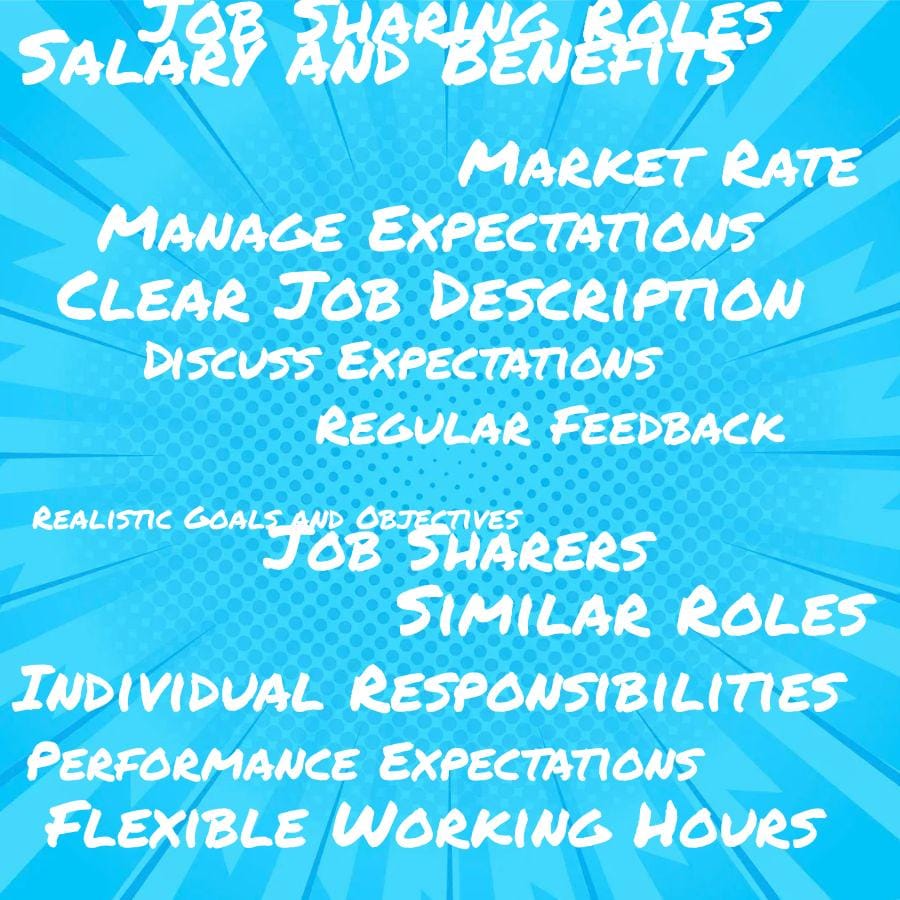To manage expectations around salary and benefits for job sharing roles, it is important to clearly communicate the responsibilities and expectations of each role, as well as any potential differences in salary or benefits. Additionally, it is essential to ensure that any compensation and benefits are fair and equitable for both job-sharers.
Job sharing is becoming an increasingly popular way to structure employment, allowing two people to share the same job while taking advantage of the benefits of having multiple perspectives and skill sets. However, managing expectations around salary and benefits for job sharing roles can be a challenge.
In this blog post, we’ll discuss some tips on how to manage expectations around salary and benefits for job sharing roles in order to ensure a successful outcome.
Research the Market Rate for Similar Roles

It involves researching what other companies are paying for similar positions, as well as looking at industry standards and trends. This research can be done online or through networking with colleagues in the same field.
By understanding the current market rate, employers can ensure that they are offering competitive salaries and benefits to their job sharers. This research will help employers set realistic expectations about salary and benefits when hiring new job sharers.
Discuss Expectations With Both Job Sharers
This means having a conversation about what each person expects in terms of salary and benefits, as well as how they will divide the responsibilities of the role between them. It is also important to consider any potential differences in experience or qualifications that may affect the amount of compensation each person receives.
By discussing these topics openly and honestly, both parties can ensure that their expectations are met and that there is an equitable division of labor. This discussion should be ongoing so that any changes in circumstances or needs can be addressed quickly and effectively.
Create a Clear Job Description Outlining Salary and Benefits
This job description should include the total compensation package, including base salary, bonus structure, health insurance coverage, vacation time, and any other benefits offered. It should also clearly define the responsibilities of each role within the job share arrangement.
By providing this information upfront, employers can ensure that all parties involved have a realistic understanding of what to expect from their employment agreement. It helps to set expectations for performance and accountability so that everyone involved knows what is expected of them in order to be successful in their role.
Set Realistic Goals and Objectives for Each Role
It’s important to ensure that both parties involved in the job share understand what their responsibilities are, as well as how they will be compensated. This can help avoid any misunderstandings or conflicts down the line.
When setting these goals and objectives, it’s important to consider factors such as workloads, hours worked, skillsets needed for each role, and other relevant details. It’s essential to make sure that both parties are comfortable with the terms of the agreement before signing off on anything.
By taking these steps upfront and ensuring everyone is on the same page about expectations around salary and benefits for a job share role, you can help create an environment of trust between all involved parties.
Ensure That Both Job Sharers Are Aware of Their Individual Responsibilities and Expectations
This includes understanding the salary and benefits associated with the role. To manage expectations around salary and benefits for job sharing roles, employers should clearly communicate what each person will be responsible for in terms of duties, hours worked, pay rate, and any additional benefits they may receive.
It is also important to make sure that both parties understand how their salaries will be divided between them if they are working different hours or taking on different tasks. Employers should provide a clear explanation of any additional perks or bonuses that may come with the position so that everyone involved knows what to expect from the role.
By setting clear expectations upfront about salary and benefits for a job share role, employers can help ensure that all parties involved have an understanding of their individual responsibilities and expectations before beginning work.
Provide Regular Feedback On Performance to Ensure That Expectations Are Being Met
This feedback should be tailored to the individual role, taking into account the unique responsibilities and contributions of each job sharer. It should also be timely, with both positive and constructive feedback given in a timely manner so that expectations can be adjusted as needed.
Regularly scheduled meetings between supervisors and job sharers are a great way to ensure that everyone is on the same page about what is expected from each person in terms of performance, salary, and benefits. It’s important to provide clear communication about any changes or adjustments that may need to be made in order for expectations to remain realistic.
By providing regular feedback on performance, employers can ensure that their job sharers are meeting their expectations while also feeling valued for their contributions.
Consider Offering Flexible Working Hours or Other Incentives to Compensate for Reduced Salary or Benefits
One way to address this is by offering flexible working hours or other incentives to compensate for reduced salary or benefits. This could include allowing employees to work from home, providing additional vacation days, or offering bonuses for meeting certain goals.
By providing these types of incentives, employers can help ensure that their job sharers feel valued and appreciated while still maintaining a reasonable budget. Employers should make sure that they are transparent about the terms of the job sharing arrangement so that all parties involved understand what is expected of them in terms of salary and benefits.